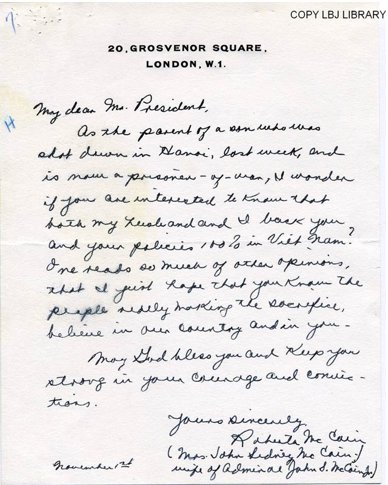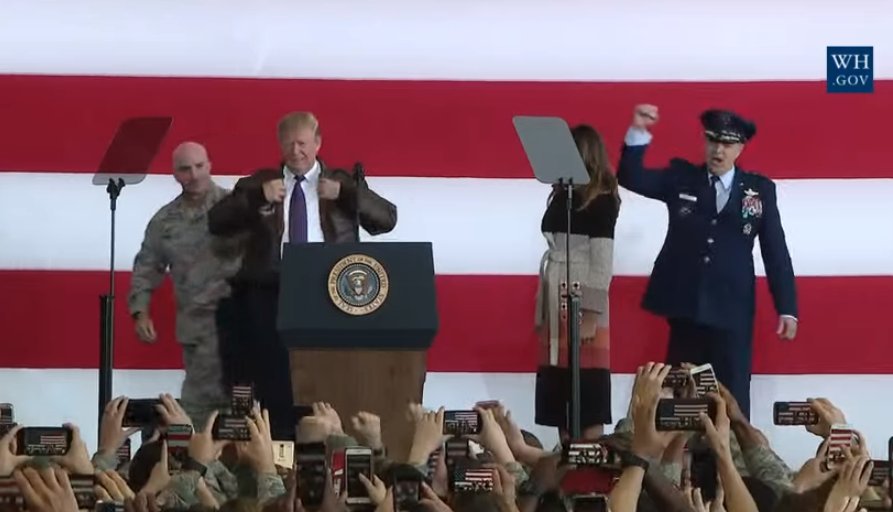As Veterans Day approaches, the relationship between America’s President and its military is arguably as volatile as it has been in recent memory, exactly at a time when they need to be marching in step.
The tragic deaths of four members of the US Special Forces in initially uncertain circumstances in Niger last month triggered not just a broad debate about the role of the military in Africa, but what appeared to be a wholly avoidable drawn-out controversy regarding President Trump’s attitude to the armed forces and their families.
After at first appearing not to acknowledge for some weeks the deaths of the servicemen, the situation quickly escalated to the point where the widow of one of the soldiers, Sgt La David Johnson, accused the President of being unable to remember her fallen husband’s name when he eventually placed a condolence call to her.
For an excruciating few days, that botched call and the resulting public back-and-forth as the President of the United States disputed the word of a Gold Star widow and her local Congresswoman left the nation confused and aghast. After initially following what the Washington Post called his traditional no-apology playbook the President managed to exacerbate things further by drawing in his Chief of Staff, Gen John Kelly, who had lost one of his own sons in Afghanistan.
Kelly, the retired Marine Corps General who according to the Post was “viewed by many in Washington as a key moral authority in the administration” – and who had famously been described by Republican Sen Bob Corker as one of the men “separating the country from chaos” – then proceeded to undermine his own credibility in the course of defending his boss.
Jules Witcover wrote in the Baltimore Sun:
Mr. Kelly, in his understandable desire not to have the slain soldier’s sacrifice lost in the whole affair, has inserted himself into unfamiliar terrain. He said twice that he would take questions only from reporters who were Gold Star parents or siblings of the deceased or who knew a Gold Star family. Such a caveat clearly is outside the bounds of a functioning free press.
Mr. Kelly up to now has been seen and admired as a self-disciplined military man who by his own demeanor and career training knew to leave politics to the politicians. His public life has been marked by acceptance if not reverence toward civilian leadership in the realm of national governance.
But in this instance, he not only attacked an elected legislator but was also guilty of the worst offense in press relations, by being demonstrably wrong on the facts.
Later, Kelly managed to lay himself open to further criticism following comments he made on Fox News about the origins of America’s bloodiest war. The Washington Post wrote that “Kelly knew what he was signing up for – when he came on as chief of staff, and when he was sworn in as homeland security secretary for a president whose campaign platform centered on building a massive wall to block out Mexicans. And still, people seem shocked at his supposed fall from grace. Why? Because it does not fit into the comforting story they’ve been telling themselves about the man they see as the only thing stopping President Trump from blowing the world to smithereens.”
That role, it seems, has now fallen by default to Defence Secretary Gen James Mattis, whom Trump described as the “nearest thing we have to [WW2 General] George Patton”. As the New York Times reports, Mattis seems to have mastered the art of disagreeing with the President “without provoking him.”
‘Time to wake up’
Of course, this wasn’t the first time Trump had been criticized for his interaction with a Gold Star family. During last year’s election campaign he publicly disparaged the parents of Humayun Khan, a Muslim serviceman killed in Iraq in 2004.
Meanwhile, Trump has long had a rocky relationship with Sen John McCain, whose war record was another of the candidate’s targets during the campaign. If there is one thing most Americans can agree on these days regardless of their political opinion – and there seem to be precious few of those – it is that McCain is a genuine military hero.

A letter from John McCain’s mother to President Johnson after her son was shot down in Vietnam, backing the President’s policies.
So it was particularly striking, then, for McCain to make a speech to the Naval Academy recently in which he warned that “it’s time to wake up,” saying that American values were under attack from “forces within democracy itself” and “parties who preach nationalism and nativism over liberal justice.”
We are asleep in our echo chambers, where our views are always affirmed, and information that contradicts them is always fake. We are asleep in our polarized politics, which exaggerates our differences and looks for scapegoats instead of answers, and insist we get all our way all the time in a system of government based on compromise and principled cooperation and restraint.
When President Trump – who himself never served – talks about “my generals and my military” it indicates that a lot of his approach to the troops and what they represent is considered primarily as a political optic; for example in instances like the attacks on protesting NFL players, and how he turned their actions over racial injustice and inequality into being about disrespect for the flag and the military that defend it.
It proved a successful move with his base, which certainly includes many service personnel, veterans and their families. Swing-state veterans chose Trump by 2-1 over Hillary Clinton last year while a poll last month for the Military Times showed a majority of serving troops had a favorable view of the President (even while indicating an interesting split between officer ranks and enlisted servicemen).

President Trump is cheered at Yokota airbase in Japan.
It was probably no coincidence, therefore, from the perspective of optics that President Trump’s trip to Asia this week kicked off at a US-controlled airbase near Tokyo, nor that his first stop on the way to Seoul for the first state visit by a US president in 25 years is at Camp Humphreys, one of the largest US bases overseas.
As the administration approaches potential flashpoints ahead, not least the still-unresolved situation involving North Korea, (following a report of likely casualties in any conflict with Pyongyang, a group of military veteran lawmakers called on the President to back off from his “provocative statements”) the White House will need more than ever to ensure the executive branch and the nation’s armed forces are on same page.
According to Politico: “The biggest challenge may be crisis management,” said Patrick Cronin, senior director of the Asia-Pacific Security Program at the Center for a New American Security. “We have to be ready for how we deal with the unexpected.”
And the unexpected includes new forms of war.
Writing recently in Slate, Andrew Swick explained how veterans had been specifically targeted by Russian social media operatives during last year’s election campaign, arguing that “the divide between military and civilians makes America weaker, and Russia knows it.”
Swick writes:
Moreover, just as the president has exploited misunderstanding and shallow patriotism to fight political battles, Russian intelligence officials utilized the same dynamics to manipulate our divisions. Our adversaries have now demonstrated how easy it is to use our differences over race, religion, and even military service to pit Americans against one another.
As this President faces unprecedented and unpredictable global challenges, therefore, understanding the importance of remembering La David Johnson’s name – and the sacrifice of his widow – is absolutely central to the efficient functioning of a relationship with the nation’s military that has to be built on mutual trust, understanding and respect.
Also published on Medium.
